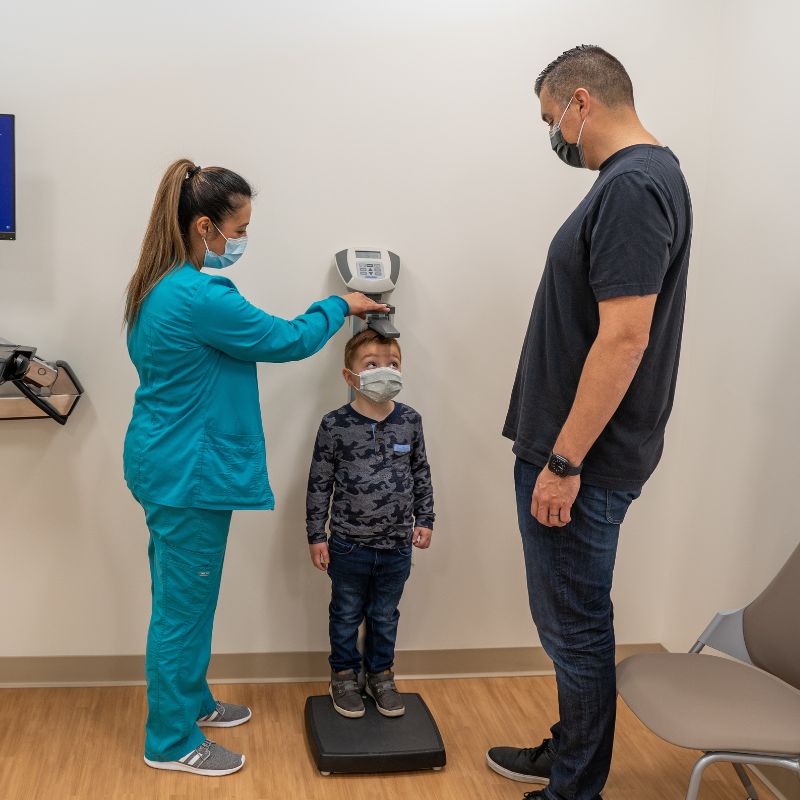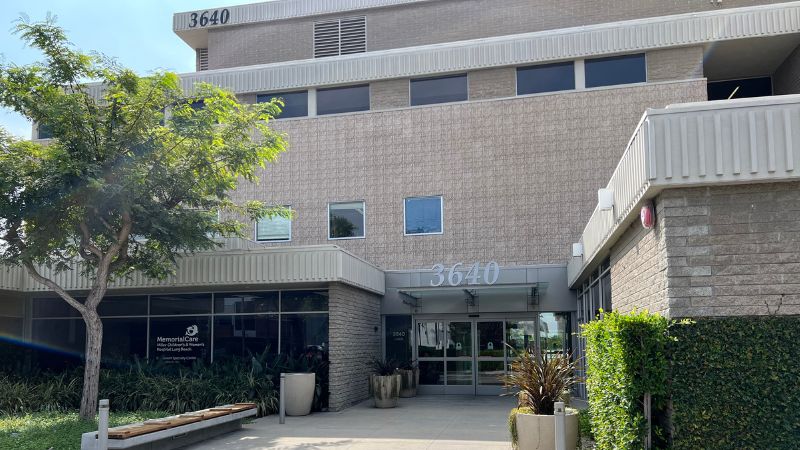The Endocrine Center treats patients with a variety of disorders of the endocrine system. Various hormones in the endocrine system can effect a person’s growth and development, tissue function and metabolism, sexual function and reproductive processes. Endocrinologists and the endocrine specialty care team work with children and their parents to diagnose, treat and manage conditions affecting the endocrine system, including disorders of the hypothalamus, pituitary gland, thyroid gland, parathyroid glands, adrenal glands, ovaries/testes pancreas.
Evaluation
A primary care physician refers a patient to a pediatric endocrinologist for evaluation of the function of the endocrine glands. The endocrine glands are responsible for the secretion of hormones throughout the body. Too much or too little of a hormone may be harmful to a person’s body. Consultation with a pediatric endocrinologist includes a recount of the history, physical examination, and appropriate diagnostic evaluation. Diagnostic studies may include radiographic or laboratory evaluation in order to determine if the child’s endocrine glands are functioning properly.
Treatment & Condition Management
The replacement or reduction of specific hormones within the body can treat and effectively manage many endocrine disorders. Early and timely treatment with medication or surgery if needed, is necessary and effective to help manage the child’s hormonal condition and minimize future complications. Continued follow-up visits will ensure hormone regulation continues.
Growth Hormone Treatment
Growth hormone therapy is indicated for treatment of growth hormone deficiency, Turner Syndrome, Prader Willi Syndrome, Chronic Renal Failure, Small for Gestation Age without catch up growth by 2 years of age, HIV wasting, and idiopathic short stature as defined by <1.2% on the standard growth chart. Patients are screened and tested to ensure there is no other cause for growth failure, such thyroid function, or presence of common conditions such as malnutrition, malabsorption, anemia or other chronic illness. When tests show that patients are candidates for growth hormone therapy, the patient, parents and medical care team discuss the patient's potential adult height, length of treatment and other treatment options if these exist.
Approved CCS Center
The Endocrine Center is a California Children’s Services (CCS) approved Special Care Center (SCC). This means a specially designated multi-disciplinary care team is responsible for all care coordination and case management of a patient in this program. Patients typically qualify for CCS by medical diagnosis, complexity of their disease and financial status.
The most common disorder of the adrenal gland in childhood is congenital adrenal hyperplasia. This disorder is characterized by a lack of or decreased production of cortisol (the stress hormone), with or without production of aldosterone (the salt retaining hormone). Instead, other hormones including the male hormone testosterone are produced which can lead to a disorder of sexual development. In order to reduce complications associated with this disease, cortisol and aldosterone are replaced in the form of a medication by mouth. Other disorders of the adrenal gland include Addison disease (an acquired defect in cortisol and/or aldosterone production), Conn disease (excess production of aldosterone), Cushing disease (excess production of cortisol), and various other adrenal problems. These disorders can be managed with medication and/or surgery.
Disorders of growth is one of the more common conditions in pediatric endocrinology. Growth disorders can occur for many reasons, which may be hormonal in nature. Growth may also be affected by other factors including nutrition, steroid use, bone disease and a variety of other chronic illnesses.
Growth is regulated by the pituitary gland, which is known as the master gland of the endocrine system. The pituitary gland releases growth hormone, in addition to multiple other hormones. Growth hormone stimulates height and is important for the development of muscle and bone. It also affects the distribution of fat throughout the body.
Besides growth hormone, the pituitary gland secretes a hormone that stimulates the thyroid gland. Thyroid hormone has a major impact on growth and development.
Some children are born with growth disorders, whereas other children develop issues with growth over time. Growth disorders can be a significant psychological issue for children, and should be addressed as soon as it becomes apparent. If growth hormone therapy is necessary, children tend to have a greater improvement in height with a longer duration of therapy.
The pituitary gland is referred to as the master gland because it controls many other glands in the body. The pituitary makes several important hormones. Over or under production of pituitary hormones can lead to any one or combination of these disorders: precocious puberty, lack of puberty, infertility, growth disorders, thyroid abnormalities, adrenal abnormalities, and diabetes insipidus (a condition when the body is not able to control water loss). The abnormal production of pituitary hormones may be caused by an abnormality in the size and/or location of the pituitary gland, or by a growth or tumor affecting the gland. Endocrinologists manage these conditions by controlling the amount of pituitary hormone with medications and, if needed, can evaluate whether the patient needs to be referred to a neurosurgeon and or hematologist/oncologist for further treatment.
Thyroid hormone plays a major role in the body’s metabolism and overall well-being. Too much thyroid hormone due to an overactive thyroid gland can lead to weight loss, diarrhea, nervousness, difficulty with sleep and a fast heart rate. An underactive thyroid gland produces too little thyroid hormone and can lead to weight gain, constipation and excessive fatigue. In children, low levels of thyroid hormone can lead to poor growth. Endocrinologists treat patients with thyroid disorders by replacing or reducing the amount of thyroid hormone in the body. Endocrinologists also receive special training to manage patients with thyroid nodules or thyroid cancer.
Centers & Programs
Every pediatric patient will need to transition to an adult physician, so they remain in an age-appropriate health care setting. Done abruptly, this change can be overwhelming and cause anxiety...
Your Care Team
There is a shortage of pediatric endocrinologists across the nation; however Miller Children’s & Women's has five board-certified pediatric endocrinologists that rotate throughout the Endocrine Center and the general pediatrics units.
Providers




Other Team Members
A physical therapist (PT) is a healthcare professional concerned with prevention, treatment and management of movement disorders arising from conditions and diseases occurring throughout the child’s growth.
A nurse who has graduated from an accredited school of nursing and has been registered and licensed to practice by a state authority.
A clinical nurse specialist (CNS) is a registered nurse with advanced education in special areas. A CNS nurses help coordinate your child’s care while in the hospital.
Dietitians and nutritionists assess patients’ nutritional needs, develop and implement nutrition programs, and evaluate and report the results. They also confer with doctors and other health care professionals to coordinate medical and nutritional needs.
Social workers help provide referrals to a broad range of community based agencies and organizations to assist the child and family in obtaining supportive care and assistance. The social worker also is available to provide crisis counseling, individual and family counseling.



